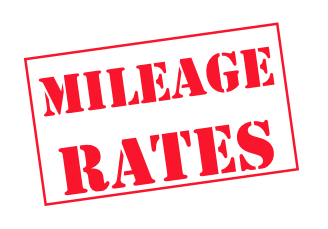- Essential Bookkeeping Habits For Audit Ready Books in Canada
- Tax Audits in Canada
- Non-Business Travel Rates
Simplified Non-Business Travel Rates
Canadian Meal and Vehicle Mileage Rates | Personal Income Taxes
By L.Kenway BComm CPB Retired
This is the year you get all your ducks in a row! Start by starting.
Updated January 22, 2025 | Originally Published on Bookkeeping-Essentials.com in March 2009
In Canada, you can claim personal travel expenses under certain conditions in accordance with the Canada Revenue Agency's (CRA) two allowable methods - the detailed method or the simplified method.
Under the simplified method, (1) meals can be claimed using a flat rate of $23 per meal with a $69 per day maximum; (2) mileage rates are released every January.
 Personal travel rates cannot be used by self-employed workers and employees for business travel. They must use other methods to claim their business travel expenses.
Personal travel rates cannot be used by self-employed workers and employees for business travel. They must use other methods to claim their business travel expenses.Highlights Of This Post
- Who can use non-business travel rates
- Northern residents deduction
- Moving expenses
- Medical travel expenses
- Who cannot use non-business travel rates
- How to claim your personal travel expenses
- Current meal and mileage rates
Who Can use Non-Business Travel Rates
You can claim non-business travel expenses for meal and vehicle travel if the trips relate to:
- the northern residents deductions;
- moving expenses; or
- your selected 12 month period of medical expenses (see tax tip below).
TAX TIP
If you live more than 40 kilometres away from medical facilities, keep a travel log as you can claim dentist, optometrist, and doctor trips under medical expenses on your personal tax return.
The Northern Residents Deduction
 In Canada, you can claim personal travel expenses under certain conditions according to the CRA.
In Canada, you can claim personal travel expenses under certain conditions according to the CRA.The Northern Residents Deduction is a special tax benefit provided by the Canada Revenue Agency (CRA) to individuals who live in designated remote areas in the northern part of the country. This is to help offset the higher cost of living, travel, and other expenses in these areas.
There are two parts to this deduction: a residency deduction for having your dwelling in the region, and a deduction for travel benefits you may receive from your employment in these remote areas. For the residency portion, individuals can claim up to $11 per day of residency in the northern zone and $5.50 for residency in the intermediate zone.
The travel benefit deduction can be used if an individual's employer provided them with travel benefits for a personal trip. This is primarily to account for the fact that many living in these areas can't access transportation as easily or cheaply.
Both employees and self-employed individuals can claim the northern residents deductions on their personal tax returns, but they must meet certain criteria. These include living in a prescribed northern or intermediate zone for a continuous period of at least six months.
Moving Expenses
In Canada, you can deduct eligible moving expenses if you move and establish a new home to work or run a business at a new location, or if you move to study courses as a student in full-time attendance enrolled in a post-secondary program at a university, college or other educational institution.
However, to qualify for the deduction, your new home must be at least 40 kilometers (by the shortest usual public route) closer to your new work or school.
Eligible moving expenses can include:
1. Travel expenses, including vehicle expenses, meals and accommodation to move you and your household members to your new home.
2. Costs for transportation and storage for household items.
3. Temporary living expenses for up to 15 days.
4. Cost of cancelling the lease for your old home.
5. Cost to maintain your old home when vacant (maximum $5,000) after you move and before the property is sold.
6. Incidental costs related to your move which can include changing your address on legal documents, replacing driver's licenses and utility hookups and disconnections.
You cannot deduct moving expenses that were reimbursed by your employer or are deductible as a business expense. Also, you must first deduct moving expenses from the income the move was related to, such as employment or self-employment income or scholarships, fellowships, bursaries, certain prizes, and research grants. If the eligible moving expenses are greater than the net eligible income earned at the new location, the excess amount can be carried forward and claimed as a deduction from the net eligible income earned at the new work or school location in the following years.
Medical Travel Expenses
In Canada, you can claim travel expenses as medical expenses under certain conditions according to the Canada Revenue Agency (CRA).
1. If you are required to travel at least 40 kilometers (one way) from your home to receive medical services, and similar services are not available closer to your home.
2. If you needed to travel at least 80 kilometers (one way) from your home to receive medical services, you can also claim the cost of meals and accommodation.
It's important to note that not all travel costs are eligible. The travel must be done to obtain medical services that were not available near your home.
For travel expenses to be deductible, it should also be noted that the travel must be in response to a certified medical need, not for personal or elective procedures. A medical practitioner must certify in writing that the medical services are needed.
Examples of eligible expenses could be:
1. Public transportation fare (for example, taxis, bus, or train)
2. Vehicle expenses
3. Meals
4. Accommodation
You can only claim travel expenses if you have already claimed all your eligible medical expenses. The amount you can claim for travel expenses is limited to the amount you would have been entitled to deduct as medical expenses if you had not traveled to obtain the medical services.
Be aware that this information can change from year to year and it's critical to have the most current understanding of the tax law.
Who Cannot Use The Non-Business Travel Rates
Self-employed workers and employees are not allowed to use the simplified method for their vehicle expenses. Your option for claiming travel expenses are as follows:
- Sole Proprietors - must use the detailed vehicle travel method -see Section 8 of IT521R - which requires keeping an auto logbook and all receipts. The rules for writing-off business use of auto expenses are complicated and very inflexible.
- Employees - can access a tax free auto allowance if it is reasonable and based solely on kilometres driven while performing your employment duties. This method requires an auto logbook but not receipts.
- Employees - may receive business travel allowances for meals, board and incidentals. The National Joint Council publishes various rates and allowances that could be used to support your company's business travel allowances. The meal and vehicle mileage rates are slightly higher than CRA's non-business travel rates.
- Incorporated Business Owners - have four reimbursement options: (a) an allowance based on business kilometres driven; (b) an flat rate allowance not based on business kilometres driven; (c) reimbursement of car expenses incurred; or (d) employee allowable employment expenses. Some options are taxable benefits; some are not.
Whatever method you use, always keep in mind the Income Tax Act's general rule for deducting a business expense.
How To Claim Your Non-Business Travel Expenses
Canada Revenue Agency (CRA) allows two methods to calculate certain non-business related travel expenses.
1. The detailed method for meal and vehicle expenses requires you to keep all your receipts to claim the expenses you actually incurred. You must keep an auto logbook to claim expenses under this method.
2. With the simplified method, you do not need to keep receipts ... BUT CRA may still ask for some documentation to support your meal and vehicle claims. Under the simplified method:

- Meals can be claimed without receipts using a flat rate of $23 per meal to a maximum of $69 a day including sales tax per person. This rate has been in effect since January 2020. Prior to that the flat rate was $17 per meal with a $51 per day maximum.
- Vehicle mileage can be claimed provided you have a travel mileage log book. Mileage rates for the 2025 tax year are not released until early 2026. Here are the mileage rates for the 2024 tax year that were released January 21, 2025.
| 2024 | Province / Territory | 2023 |
|---|---|---|
| 57.5 | British Columbia | 56.5 |
| 71.5 | Yukon | 70.5 |
| 54.5 | Alberta | 53.0 |
| 55.0 | Saskatchewan | 52.5 |
| 70.0 | Northwest Territories | 70.5 |
| 54.5 | Manitoba | 54.5 |
| 60.5 | Ontario | 59.0 |
| 58.0 | Quebec | 57.5 |
| 70.5 | Nunavut | 67.5 |
| 60.5 | Newfoundland & Labrador | 59.0 |
| 58.5 | New Brunswick | 57.5 |
| 59.5 | Nova Scotia | 58.0 |
| 57.5 | Prince Edward Island | 56.0 |
References: CRA's Northern residents deductions; CRA's Moving expenses; CRA's Details of medical expenses> Travel expenses
Back to top











